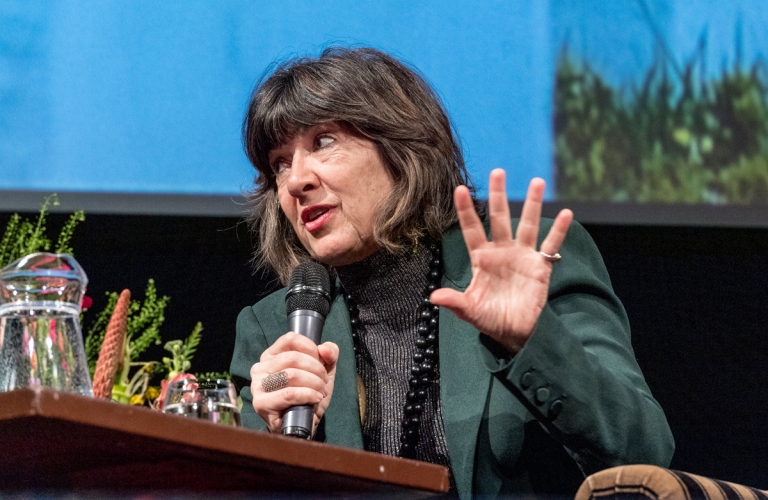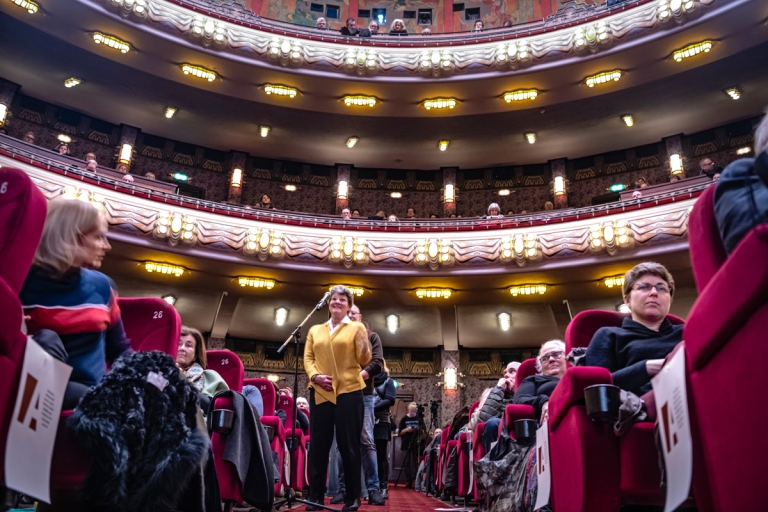Christiane Amanpour, Chief International Anchor at CNN, tells an Aegon-sponsored event in Amsterdam about her 30 years in journalism.

The evening with the broadcasting icon was subtitled From the Gulf War to the Trump Presidency. Yet, the audience for the sold-out event, hosted by the John Adams Institute in Amsterdam's Pathé Tuschinski cinema, got a lot more.
Amanpour transformed the evening into a masterclass on journalism. She emphasized that the truth and a curiosity to learn are key ingredients. A fitting response to the current trend among some world leaders to dismiss news organization like CNN as "fake news".
Interview choreography
As host of the news network's award-winning global affairs program 'Amanpour', she is currently best known for her interviews with leading figures in society.
Dutch journalist and moderator Eelco Bosch van Rosenthal said conducting a good interview wasn't easy. "You need to ask tough questions without showboating. You need to be aggressive without ruining the chance to get honest answers. You need sometimes to be very empathetic, while being able to interject a ruthless question, if that is appropriate."
While she has conducted countless major interviews, US President Donald Trump is one of the three world figures who Amanpour has yet to get in the interview chair. The other two are Pope Francis and British queen, Elizabeth II. "I have tried a number of times to talk to President Trump, and though I thought I was close it has never happened."
How would she handle such an interview? Calmly and meticulously, similar to when she covered her floor with newspaper clippings to choreograph an interview with reform-minded Iranian President Mohammad Khatami (1997-2005).
For Amanpour "being a journalist while female" has been an advantage to achieve first contact. Sometimes nothing works. Amanpour recalled how Mahmoud Ahmadinejad, the hardline Iranian president from 2005 to 2013, removed his microphone and walked out after the first question in an interview that CNN had heavily publicized. With a mixture of annoyance and amusement she asked rhetorically, "Who does that?"
Christiane Amanpour (photo: Gerrit Serné)
From interviewer to interviewee
Amanpour, in contrast, stood her ground and seemed to relish the transition from interviewer to interviewee as she filled two hours of the talk in Amsterdam with accounts from her career and life lessons.
Born in London to a British mother and a Persian father, Amanpour spent most of her early years in Iran. Her family stayed after the Iranian Revolution in 1979, while she went to university in the United States.
The long running hostage crisis at the US embassy in Tehran created a hostile environment on campus in the United States. Stones were even thrown at Hispanic students who were mistaken as Iranians. "I had the immigrant experience-plus...I had to figure out how to navigate the minefield." Like most immigrants, Amanpour felt she had to work twice or three times as hard to fit. "I had to prove I was a good Iranian. That I wasn't a terrorist".
Brought up to be curious from an early age and motivated by the failure of her original dream to become a doctor, Amanpour jumped at the chance to join CNN, the news channel set up by Ted Turner in 1980 to "beat the system".
Many observers were not impressed by the idea of 24-hour news and dismissed Atlanta-based CNN as "Chicken Noodle News". Amanpour, however, was among a group of university graduates who joined enthusiastically. "I was paid less than 10,000 dollars a year in the beginning," Amanpour recalled. That has since changed markedly during her illustrious career. "I am now proud to be paid fairly compared to men of my stature," she added.
CNN International
Several years later Turner created CNN International, having insisting his correspondents based outside the United States be designated as 'international' rather than 'foreign'. From 1990 Amanpour reported on international crises in Iraq, Afghanistan, Bosnia, North Korea, Palestinian territories, Iran and many other countries.
Reporting from the War in Bosnia was a formative experience for her and her career. Recalling how the land outside a skating ring was transformed into a graveyard during the Siege of Sarajevo, Amanpour emphasized the importance of reporting the truth and avoiding making false equivalents was very important. She noted with grim satisfaction that the International Criminal Court in The Hague branded several acts during the war as genocide.
In a more recent departure Amanpour has turned her attention to important issues in the lives of regular people that often don't make the daily news. In a documentary entitled Sex and Love around the World, Amanpour meets women in various countries to discuss the changing roles for both men and women and how this relates to sex, love, marriage and divorce. The six-part series is available on Netflix.
Audience questions (photo: Gerrit Serné)
John Adams in Amsterdam
Amanpour's position has also been changed in another very fundamental way by working for US-owned CNN. While she is British-Iranian and does not hold a US passport, the event was the latest offering by the John Adams Institute over its 30-year history to strengthen the cultural ties between the United States and the Netherlands.
The Institute's name commemorates John Adams who was a co-author of the US Declaration of Independence and a lover of culture and scholarship. He was the young country's first emissary to the Netherlands and went on to be the second President of the United States.
Aegon, which operates as Transamerica in the United States, has been a sponsor of the John Adams Institute since the beginning. The Institute does not receive funding from any government bodies and relies on audience, members and patrons and corporate sponsors, including Aegon.

